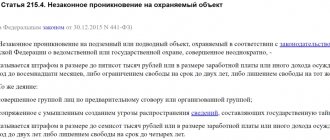New edition of Art. 165 of the Criminal Code of the Russian Federation
1. Causing property damage to the owner or other possessor of property by deception or abuse of trust in the absence of signs of theft, committed on a large scale, -
shall be punishable by a fine in the amount of up to three hundred thousand rubles, or in the amount of the wages or other income of the convicted person for a period of up to two years, or by forced labor for a term of up to two years with or without restriction of freedom for a term of up to one year, or by imprisonment for a term of up to two years. years with a fine in the amount of up to eighty thousand rubles or in the amount of the wages or other income of the convicted person for a period of up to six months or without it and with restriction of freedom for a period of up to one year or without it.
2. The act provided for in part one of this article:
a) committed by a group of persons by prior conspiracy or by an organized group;
b) causing particularly large damage, -
shall be punishable by forced labor for a term of up to five years, with or without restriction of liberty for a term of up to two years, or by imprisonment for a term of up to five years with a fine in the amount of up to eighty thousand rubles or in the amount of the wages or other income of the convicted person for a period of up to six months, or without it and with or without restriction of freedom for a term of up to two years.
Commentary on Article 165 of the Criminal Code of the Russian Federation
1. Along with the main object, a crime may optionally encroach on the normal procedure established by law for carrying out entrepreneurial and other economic activities.
2. Being material, the elements of a crime are characterized by an action or inaction, harmful consequences in the form of causing property damage to the owner or other possessor of property and a causal relationship between the act and the resulting consequences.
3. An act that is criminalized comment. article, similar to fraud mainly in the method of committing it. The main difference between these offenses is that in fraud, the perpetrator encroaches on the property in the possession (funds) of the owner. When property damage is caused by deception or abuse of trust, the victim's fixed assets are not reduced. However, as a result of this act, material benefits (money, property) do not flow into the funds. In this case, property damage is caused in the form of lost profits, for example, the conductor of a carriage, the driver of an intercity bus and other vehicles receiving money from passengers for traveling without a ticket; evasion of rent, payment for hotel accommodation, rental of certain items, repair of household appliances, use of gas, electricity and other utilities, etc. <1>. ——————————— <1> See also: BVS RF. 1999. N 2. P. 16.
4. The crime provided for by the comment. article should be distinguished from such criminal acts as illegal receipt of a loan (Article 176), evasion of customs duties (Article 194), evasion of taxes and (or) fees from an individual (Article 198), evasion payment of taxes and (or) fees from the organization (Article 199). The latter are special compounds in relation to causing property damage through deception or abuse of trust.
5. The crime is completed (by the elements) at the moment of causing property damage to the owner or other owner of the property. At the same time, the qualification is not affected by the fact whether the perpetrator received a property benefit or not.
6. The subject of a criminal offense is a sane individual who has reached the age of 16 at the time of the commission of the crime.
7. The subjective side is characterized by direct intent and selfish purpose.
8. Part 2 comments. Article provides as qualifying features the commission of a crime by a group of persons by prior conspiracy or on a large scale, the content of which coincides with that of similar circumstances specified in Art. 158. The same can be said about especially qualifying criteria: commission of a crime by an organized group; causing particularly large damage.
9. The main composition describes acts that are included in the category of crimes of minor gravity, qualified and especially qualified - of medium gravity.
Arbitrage practice
To better understand all the intricacies when Article 167 of the Criminal Code of the Russian Federation is applied, we will look at several examples of intentional damage to someone else’s property from judicial practice.
Example 1. Citizen S., who had previously been in a relationship with citizen A., upon learning of citizen A’s betrayal, crashed his car - a Toyota Corolla XII (E210) worth 1,900,000 rubles. Citizen S. smashed the windshield, right and left mirrors, punctured two front wheels, and scratched the right fender. Also, due to numerous impacts, there are dents on the left side of the car and on the hood. Citizen S. caused damage to citizen A in the amount of 75,000 rubles. The court ordered citizen S. to compensate citizen A. for damage to her car in the amount of 75 thousand rubles and compulsory work for a period of 120 hours.
Example 2. Citizen K., during a quarrel with citizen B., damaged the leather bag of citizen B. Citizen K. inflicted 4 deep scratches, which significantly spoiled her appearance. In addition, in a fit of anger, she tore out the zipper that closed the bag, which made it impossible to use it further. The amount of damage caused to citizen B. is 8,000 rubles. In view of the fact that the monthly income of citizen B. is 100,000 rubles, the court found the damage caused by citizen K. to be insignificant. Citizen K. was sentenced under Article 7.17 of the Administrative Code in the form of a fine in the amount of 500 rubles.
Example 3. Citizen R. parked in a parking lot near a shopping center. During the maneuver, he touched the car of citizen M. Citizen R. scratched the left fender and broke the side mirror on citizen M.’s car. In court, citizen M. demanded to be punished for causing damage to the property of citizen R. under Part 1 of Article 167 of the Criminal Code of the Russian Federation, arguing that that citizen R. saw that the free parking space was quite narrow and knew that he could damage citizen M.’s car, but still continued to perform the maneuver. The court rejected the request of citizen M. Due to the lack of intent, citizen R. was sentenced under Article 168 of the Criminal Code of the Russian Federation in the form of a fine in the amount of 20 thousand rubles.
Another comment on Art. 165 of the Criminal Code of the Russian Federation
1. The subject of the crime is property gain, i.e. an increase in property that should increase the value of the victim’s property.
2. The objective side of the crime is characterized by causing property damage through deception or abuse of trust in the absence of signs of theft (fraud) committed on a large scale.
Such property damage (and this is the difference from fraud) is caused as a result of the non-transfer of the perpetrators, the retention of property (including non-payment of funds), which, in accordance with the law, other legal act, or agreement, should go to the victim. The methods of committing a crime are deception or abuse of trust (clause 16 of the Resolution of the Plenum of the Supreme Court of the Russian Federation of December 27, 2007 N 51 “On judicial practice in cases of fraud, misappropriation and embezzlement” and commentary on Article 159 of the Criminal Code of the Russian Federation).
3. The crime is considered completed from the moment the person fails to fulfill his obligation to transfer property or pay money to the victim in a large amount.
4. The qualifying features of this crime (Part 2) coincide with similar features of Art. Art. 158 - 159 of the Criminal Code of the Russian Federation.
Liability of minors for damage to property
For intentional destruction of someone else's property, responsibility begins at the age of 16. If the destruction or damage to property was carried out for hooligan reasons and is qualified under Part 2 of Article 167, liability begins at the age of 14.
When assigning a punishment, the court must take into account the circumstances that prompted the minor to such actions, as well as his upbringing.
Sometimes the court may decide that correction of a citizen is possible through the use of compulsory educational measures. In this case, in accordance with Article 90 of the Criminal Code of the Russian Federation, the minor is released from liability.
Article 165. Causing property damage by deception or abuse of trust
- home
- Laws and regulations
- Criminal Code of the Russian Federation
- Article 165. Causing property damage by deception or abuse of trust
1. Causing property damage to the owner or other possessor of property by deception or abuse of trust in the absence of signs of theft, committed on a large scale,
is punishable by a fine in the amount of up to three hundred thousand rubles or in the amount of the wages or other income of the convicted person for a period of up to two years, or forced labor for a term of up to two years with or without restriction of freedom for a term of up to one year, or imprisonment for a term of up to two years with a fine in the amount of up to eighty thousand rubles or in the amount of the wages or other income of the convicted person for a period of up to six months, or without it and with or without restriction of freedom for up to one year.
2. The act provided for in part one of this article:
a) committed by a group of persons by prior conspiracy or by an organized group;
b) causing particularly large damage, -
shall be punishable by forced labor for a term of up to five years, with or without restriction of liberty for a term of up to two years, or by imprisonment for a term of up to five years with a fine in the amount of up to eighty thousand rubles or in the amount of the wages or other income of the convicted person for a period of up to six months, or without it and with or without restriction of freedom for a term of up to two years.
Commentary on Article 165
An object
This crime is similar to the main object of extortion; this crime can also be classified as an attack on property as a whole - the amount of legally protected property rights and interests of participants in civil transactions.
In the law as a victim
the owner or other owner of the property is indicated. From this we can conclude that the subject of the crime is property in the sense of a thing. Actually this is not true. There is no subject to this crime; any person who has suffered damage can be recognized as a victim, even if he does not act as the owner or owner of the property, but as a participant in an obligatory relationship, a producer of work or a performer of services.
Objective side
crime is expressed in action, consequence, causal connection between them and alternative methods of committing a crime (deception or breach of trust).
This crime is similar in method to fraud, embezzlement and embezzlement and differs from them in the absence of individual elements of these crimes. For example, Art. 165 of the Criminal Code of the Russian Federation is applied in the absence of the subject of theft, as well as in a situation where the damage is caused not in the form of loss of property, but in the form of lost income (lost profits).
Signs of the act
are not specified in the law, this can be any action or inaction that causes property damage.
Property damage
may result in any losses, including lost profits (lost income).
Methods
committing a crime: deception or breach of trust. Unlike fraud, both methods have independent meaning.
Deception
is understood in the same way as in fraud. Unlike fraud, the damage is not associated with the loss of property and its transfer to the criminal. Yes, Art. 165 of the Criminal Code of the Russian Federation applies to evasion by fraud from payment for electricity, other utilities, telephone services, transport and any other work and services. For example, if a person uses the services of a beauty salon and then disappears without paying, all the signs of this crime are present (unless the act is considered minor). In practice, deception in committing this crime is understood very broadly. If a person, for example, makes technical changes to the telephone network that allow him to conduct unpaid long-distance or international telephone conversations, the act is qualified precisely under Art. 165 of the Criminal Code of the Russian Federation. It does not matter whether the damage is caused directly to the communications organization or whether the calls are made at the expense of one of its clients.
“Infliction of property damage through deception or abuse of trust in the absence of signs of theft should be distinguished from fraud (Article 165 of the Criminal Code of the Russian Federation). In the latter case, there are no, in their entirety or separately, such obligatory signs of fraud as illegal, gratuitous final confiscation and (or) conversion of someone else’s property for the benefit of the perpetrator or for the benefit of other persons, committed for mercenary purposes. When deciding whether a person’s actions contain corpus delicti, liability for which is provided for in Article 165 of the Criminal Code of the Russian Federation, the court must establish whether the owner or other owner of the property suffered real material damage or damage in the form of lost profits, that is, lost income that this person would have received under normal conditions of civil circulation if his right had not been violated by deception or abuse of trust" (clause 16 of the Resolution of the Plenum of the Supreme Court of the Russian Federation of December 27, 2007 No. 51 "On judicial practice in cases of fraud, misappropriation and waste").
Does not constitute a crime under Art. 165 of the Criminal Code of the Russian Federation, evasion of taxes, fees and customs duties in the absence of a large amount required for tax crimes. The rules on tax crimes are special in relation to the article in question of the Criminal Code of the Russian Federation. Having defined the line of criminality in these norms by indicating a large scale of evasion, the legislator thereby decriminalized tax evasion that does not reach a large scale.
The theft of tickets and other signs committed by a person for the purpose of using it as a means of payment for transport services must be qualified under Art. Art. 325, 30 and 165 of the Criminal Code of the Russian Federation as theft of forms and preparation to cause property damage by deception, and in cases of their actual use - for a set of crimes provided for in Art. 325 and 165 of the Criminal Code of the Russian Federation (clause 6 of the Resolution of the Plenum of the Supreme Court of the Russian Federation of December 23, 1980 No. 6 “On the practice of application by the courts of the Russian Federation of legislation when considering cases of theft in transport”).
Breach of trust
as a method of committing this crime is closer to a method of appropriation and embezzlement than to a method of fraud. Not every breach of trust can be understood as a method necessary for the existence of a crime under Art. 165 of the Criminal Code of the Russian Federation. In particular, trust within the framework of credit relations is not enough to qualify the offense under this article. Failure to repay a debt, even intentionally, is not a crime; it is a matter of dispute in civil proceedings. There may be good reasons for not repaying a debt. It is not the failure to fulfill a civil obligation as such that is criminal, but the theft of other people’s money, committed by deception in the intention of fulfilling the obligation, but this crime is not qualified under Art. 165, and according to Art. 159 of the Criminal Code of the Russian Federation.
The breach of trust characteristic of the crime in question is only possible within the framework of a fiduciary relationship. These are relationships based on trust (civil or labor), by virtue of which a person acquires powers over someone else’s property and is obliged to act in good faith (bona fide) in the interests of others. Breach of trust in relation to Art. 165 of the Criminal Code of the Russian Federation, therefore, should be understood as abuse of powers over someone else’s property or actual capabilities arising from these powers
.
Causing property damage through abuse of trust is qualified under Art. 165 of the Criminal Code of the Russian Federation in the absence of signs of misappropriation and embezzlement (Article 160 of the Criminal Code of the Russian Federation), abuse of authority (Article 201 of the Criminal Code of the Russian Federation) and abuse of official powers (Article 285 of the Criminal Code of the Russian Federation). This rule is subject to application, for example, in the case of abuse of the powers and capabilities of an attorney (for example, a bribed representative in an arbitration process abandoned the claim), a guardian (for example, a guardian allowed his relative to rent out the property of the ward and appropriate the income from this), as well as employees who are trusted, but do not fall into the category of officials and managers in commercial organizations (for example, a train conductor or bus driver transports stowaways, pocketing fares).
Material elements of the crime
. The crime will be completed from the moment the consequences in the form of property damage occur.
Subjective side
a crime is characterized by guilt only in the form of direct intent, when the perpetrator is aware of the social danger of his act, foresees the possibility or inevitability of the occurrence of socially dangerous consequences and desires their occurrence.
The issue of selfish purpose
is resolved ambiguously. The law does not specify selfish purpose as an element of a crime. Before the revolution of 1917, the legislator proceeded from the fact that a selfish goal is not a mandatory sign of abuse of trust. For example, a criminal may pursue the goal of causing harm to a ward. In modern legal literature, this crime is usually classified as a selfish crime against property. In practice there are also no cases of application of Art. 165 of the Criminal Code of the Russian Federation in the absence of a selfish goal.
Subject
general crime - a sane person who has reached the age of sixteen years.
Qualifying features
: group of persons by prior conspiracy, large size (Part 2 of Article 165 of the Criminal Code of the Russian Federation); organized group, especially large damage (Part 3 of Article 165 of the Criminal Code of the Russian Federation).
Group of persons by prior conspiracy
and
an organized group
are understood in the same way as in theft.
Large
and
especially large amounts of damage
are calculated according to the same rules as for theft, taking into account the fact that it is not the cost of the stolen property that is taken into account, but losses in full.





